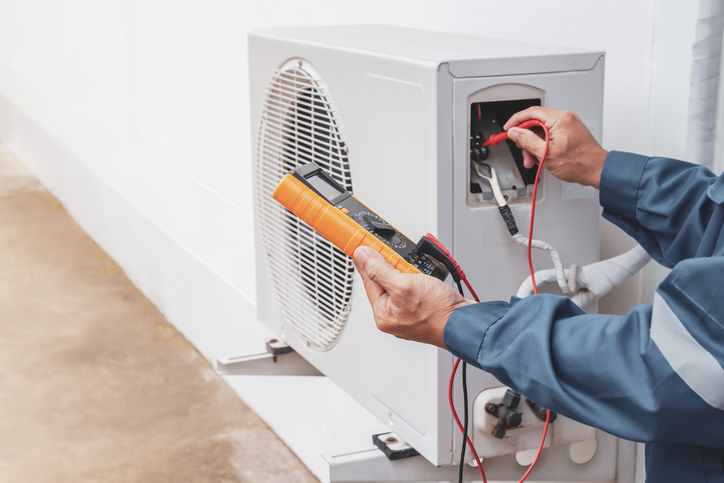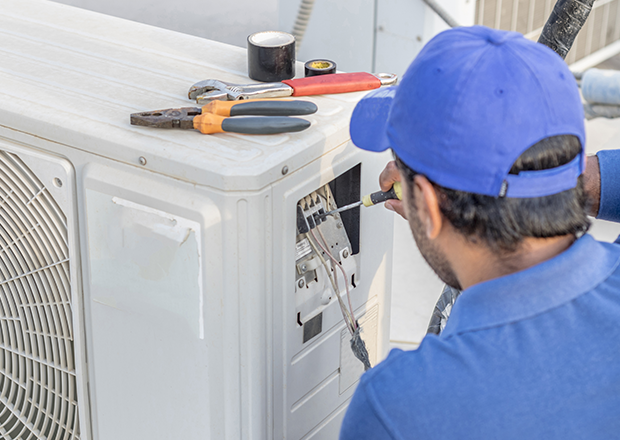HVAC company vs independent tech: choosing wisely
Wiki Article
The Value of A/c Understanding: Uncovering Causes of AC Issues for Home Owners
Home owners usually overlook the significance of understanding their HVAC systems. Identifying usual indicators of cooling issues can result in prompt treatments. Problems like insufficient air conditioning or unusual sounds are not simply inconveniences; they can indicate much deeper issues. By discovering the origin of these problems, home owners can boost system efficiency and prolong its lifespan. What are one of the most widespread concerns that can develop, and exactly how can they be properly dealt with?Common Indicators of Air Conditioner Troubles
Just how can property owners recognize problems with their cooling systems before they rise? Recognizing usual indications of AC problems is crucial for timely upkeep. One common sign wants air conditioning; if the cooling system falls short to decrease the indoor temperature level, it might signal underlying problems. Uncommon sounds, such as grinding or hissing, can likewise suggest mechanical failings or loose components - AC repairman. In addition, home owners must be wary of unusual smells originating from the unit, which might suggest mold and mildew development or electric issues. Frequent cycling on and off, called brief biking, can show thermostat problems or refrigerant leaks. An increase in energy expenses without a corresponding surge in use may aim to ineffectiveness. By staying sharp to these indication, homeowners can avoid extra significant issues and costly fixings, ensuring their cooling systems run effectively throughout the warmer months
Comprehending Refrigerant Issues
Refrigerant issues can considerably influence the efficiency of an a/c system. Property owners should be conscious of the signs of reduced cooling agent degrees and the importance of discovering cooling agent leakages. Dealing with these troubles without delay can avoid more damage to the system and guarantee height cooling down efficiency.Low Refrigerant Levels
A typical issue that property owners might come across with their cooling and heating systems is low refrigerant degrees, which can greatly impact the system's efficiency and efficiency. Refrigerant is crucial for the cooling process, taking in warmth from indoor air and releasing it outside. When degrees drop, the cooling system struggles to cool the space efficiently, resulting in enhanced energy consumption and potential system stress. Symptoms of reduced refrigerant consist of poor air conditioning, longer run times, and ice development on the evaporator coils. Homeowners may additionally discover unusual sounds as the compressor functions harder to make up for the deficiency. It is essential for property owners to understand the importance of keeping appropriate refrigerant levels to ensure peak HVAC performance and durability.Refrigerant Leaks Detection
Where might a homeowner start when encountered with the possibility of refrigerant leaks in their HVAC system? The initial step includes keeping an eye on the system's performance. Signs such as decreased cooling down efficiency, ice formation on coils, or hissing audios may suggest a cooling agent leakage. Home owners must additionally look for visible indicators of oil residue, usually a warning sign of a leakage. Utilizing a cooling agent leakage detector can provide even more precise identification. If uncertainties persist, seeking advice from a licensed HVAC service technician is important, as they have the experience and equipment to locate leaks effectively. Prompt discovery and repair of refrigerant leaks not just improve system efficiency but likewise prevent possible ecological damage, making it a necessary aspect of HVAC upkeep.Electrical Failures and Their Impact
Electrical failures can considerably impact heating and cooling systems, especially via problems like circuit breaker breakdowns and damaged electrical wiring. These problems not only interrupt the system's efficiency but can also bring about pricey fixings and security dangers. Recognizing the implications of such failures is crucial for homeowners to maintain an effective and risk-free cooling and heating environment.Circuit Breaker Issues
Just how can circuit breaker problems affect the effectiveness of a cooling and heating system? Breaker work as important safety gadgets that handle electric circulation to cooling and heating systems. If a breaker trips frequently, it interrupts power supply, bring about inconsistent home heating or cooling. This can cause considerable pressure on the system, resulting in ineffective procedure and prospective damages to elements. Property owners may see increased energy costs due to the HVAC system's battle to preserve wanted temperatures. In addition, duplicated disturbances from stumbled breakers can reduce the life expectancy of the AC unit, calling for pricey fixings or replacements. Normal upkeep of breaker is important, as it ensures a stable power supply, eventually boosting the general performance of the cooling and heating system.Faulty Wiring Effects
Regularly neglected, faulty electrical wiring can have alarming consequences for heating and cooling systems. Wiring problems may result in brief circuits, causing constant failures and boosted repair work costs. Furthermore, incorrect wiring can create inefficient power use, resulting in higher utility costs and pressure on the system. In severe cases, defective circuitry can cause electric air conditioner repair fires, posturing a significant safety risk to homeowners. In addition, these electrical failings can harm HVAC parts, resulting in costly replacements or comprehensive repair work. Homeowners need to prioritize routine examinations by qualified experts to determine and fix wiring problems prior to they intensify. Understanding the effects of defective electrical wiring can help guarantee the long life and security of heating and cooling systems, ultimately securing both the home and its passengers.Clogged Filters and Their Consequences
While many home owners may overlook the relevance of routine filter upkeep, clogged up filters can cause significant effects for a/c systems. When filters become blocked with dust, dust, and particles, airflow is restricted. This decrease in air movement requires the system to function harder, bring about increased energy intake and potentially greater energy costs. In time, this stress can cause wear and tear on elements, resulting in premature system failing.Additionally, clogged filters can endanger interior air top quality. Contaminants and allergens may flow throughout the home, worsening breathing issues and allergies for residents. In addition, inadequate air flow can create the evaporator coil to ice up, causing costly repair services and ineffective cooling performance. On a regular basis changing or cleaning filters is a basic yet crucial upkeep job that can assist assure the durability and efficiency of cooling and heating systems, eventually profiting both the house owner's comfort and their financial resources.

Thermostat Malfunctions Clarified
What happens when a thermostat malfunctions can greatly impact both convenience and energy effectiveness in a home (AC repairman). A malfunctioning thermostat may fail to accurately read the temperature level, bring about overcooling or inadequate cooling. This inconsistency can create pain for passengers and cause greater energy expenses, as the heating and cooling system functions more difficult than essentialCommon problems consist of dead batteries, which can render electronic thermostats inoperative, and loose wiring that interferes with interaction between the thermostat and the cooling and heating system. In addition, outdated or improperly calibrated thermostats might not respond properly to temperature level changes, additionally exacerbating power inadequacy.
Home owners must be cautious for indications of malfunction, such as irregular temperatures or unanticipated power costs. Routine checks and understanding of the thermostat's functionality can aid determine problems early, making sure peak efficiency of the HVAC system. Resolving thermostat problems immediately is crucial for maintaining a comfy living setting and handling energy consumption efficiently.
The Function of Routine Upkeep
Routine upkeep plays an important duty in ensuring the longevity and effectiveness of cooling and heating systems. Property owners that focus on routine checks can avoid small problems from intensifying right into costly repair work. Regular maintenance typically consists of jobs such as cleansing filters, evaluating ductwork, and examining refrigerant degrees. These activities help preserve suitable air flow and system performance, reducing energy intake.A well-maintained Heating and cooling system operates a lot more effectively, offering regular comfort throughout the home. Regular tune-ups can additionally expand the life expectancy of the unit, bring about significant cost savings with time. House owners are encouraged to set up professional examinations at the very least annually to identify potential problems early.
Additionally, many producers require normal maintenance to copyright warranties, making this technique not just useful however commonly required. On the whole, understanding the value of routine upkeep empowers house owners to guard their heating and cooling systems against unanticipated failures and improve their financial investment in home comfort.
Regularly Asked Questions
Just How Can I Improve My A/c's Power Effectiveness?
Improving an AC's energy effectiveness includes normal maintenance, cleansing or changing filters, securing ductwork, guaranteeing appropriate insulation, utilizing programmable thermostats, and scheduling expert examinations to determine and fix potential issues influencing performance.
What Is the Lifespan of a Normal A/c Device?
A common a/c device has a life-span of 15 to 20 years, depending on maintenance, usage, and environmental variables. Regular upkeep can substantially extend its operational life and enhance total effectiveness.
When Should I Change My Air Conditioning System?
An air conditioning system should commonly be changed every 10 to 15 years. Indications for substitute include frequent repair services, climbing power bills, and not enough air conditioning, showing that an upgrade might be more affordable and reliable.Can I Repair Air Conditioning Problems Myself?
Yes, individuals can repair AC troubles themselves by examining filters, making certain power supply, and checking for visible problems (ac unit replacement). Complicated problems usually need specialist support for precise diagnosis and risk-free repair service, ensuring suitable system performance.
Exactly how Do I Pick a Trusted Heating And Cooling Professional?

To choose a trustworthy HVAC professional, one ought to look for recommendations, inspect online evaluations, validate licenses and insurance, assess experience, and demand thorough estimates to assure quality solution and fair pricing prior to choosing.
Conclusion
To sum up, a strong understanding of cooling and heating systems allows property owners to successfully identify and deal with common cooling issues. Identifying signs such as insufficient air conditioning or climbing power costs permits prompt treatments, which can significantly improve system performance and long life. By remaining educated regarding possible troubles like cooling agent leakages, electric failings, and clogged up filters, homeowners can take positive actions to keep their systems, inevitably making certain convenience and advertising a healthier living atmosphere. Routine maintenance remains key to this endeavor.Report this wiki page